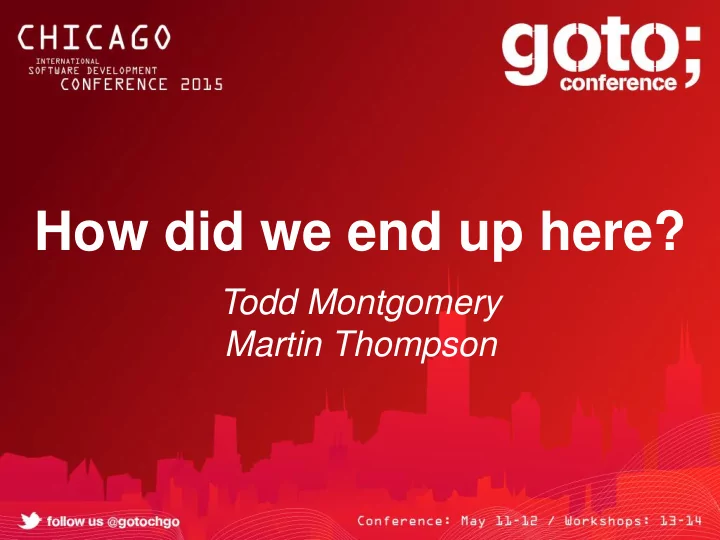

How did we end up here? Todd Montgomery Martin Thompson
How bad can things really be?
Software Project Success Rates Successful Challenged Failure Ad-hoc 49% 37% 14% Iterative 61% 28% 11% Agile 60% 28% 12% Traditional 47% 36% 17% - Dr Dobbs 2010
Software Project Success Rates – by Team Size < 10 11 - 25 > 25 Ad-hoc 70% 58% 40% Iterative 88% 68% 55% Agile 83% 70% 55% Traditional 69% 51% 50% - Dr Dobbs 2010
Well that’s the optimistic view!
Software Project Success Rates Successful: 32% Challenged: 44% Failure: 24% – Standish Group Chaos Report 2010
Software Project Failure Rates < $350,000: 20% $350,000 - $1,000,000: 25% > $1,000,000: 28% – Gartner 2012
In a study of over 5400 large scale projects (> $15m) 17% go so badly that they threaten the existence of the company undertaking them – The McInsey Group with Oxford University 2012
Sacred Cows - It’s BBQ Time!!!
Enterprise Software
ent • ter • prise noun \ ˈ en-t ə (r)- ˌ prīz \ : a project or activity that involves many people and that is often difficult : the ability or desire to do dangerous or difficult things or to solve problems in new ways Source: http://www.merriam-webster.com/
Naming Matters !!!
Product Management
Minimum Viable Product ?
Product Owner ?
Technologists ARE part of the business
Take responsibility for ROI
How can I get an answer for the minimum investment?
Agile Methods
Water-scrum-fall
What really matters?
Need to focus on learning, feedback cycles, and outcomes
There is an uncomfortable truth…
“What would have been different if you were not involved?”
Manifestos
Agile NoTCP Reactive
Build on the shoulders of giants
Shared Mutable State
“…Shared Mutable State...” the most feared words in computing
…if not they should be!
Shared Mutable State should only be used for systems programming
Embrace append-only, single writer, and shared nothing designs
If you don’t... math will hunt you down and there is nowhere to hide!
Universal Scalability Law 20 18 16 14 12 Speedup 10 8 6 4 2 0 1 2 4 8 16 32 64 128 256 512 1024 Processors Amdahl USL
Be ruthless in reducing complexity
Text Encoding
But it’s human readable...
Binary is hard to work with...
Big Data
Communications Battery life and bandwidth?
Synchronous Comms
Bad things will happen!!!
Synchronous Communication is the crystal meth of distributed programming
Causes a coupling in location and time
Errors need to be first class messages
Are your micro services on crystal meth?
Abstraction
“All non -trivial abstractions, to some extent, are leaky.” - Joel Spolsky
“The detail of underlying complexity cannot be ignored.”
“the purpose of abstracting is not to be vague, but to create a new semantic level in which one can be absolutely precise” - Dijkstra
We could say the main issue is that people don’t understand abstractions...but...
Sins committed in the name of Abstraction
ORMs !!!
Functional Programming
What is the biggest issue with functional programming?
Functional Programmers
Functional programming is NOT the answer to multi-core
Software Transactional Memory was a failed experiment!
Universal Scalability Law 20 18 16 14 12 Speedup 10 8 6 4 2 0 1 2 4 8 16 32 64 128 256 512 1024 Processors Amdahl USL
No Mechanical Sympathy?
However there is genuine brilliance in functional programming
Collaborate and great things can happen...
Throw hardware at it… development is too expensive
The free lunch is over… we cannot be sloppy anymore…
Loops L0 1534 µops LB 28 µops LB 28 µops
Code must be simple and composable
Cache Sub-System MOB L0(I) – 1.5k µops 128 bits / cycle 16 Bytes / cycle TLB LF/WC Pre-fetchers Buffers L1(D) - 32K L1(I) – 32K 32 Bytes / cycle 32 Bytes / cycle TLB Pre-fetchers L2 - 256K 32 Bytes / cycle Ring Bus QPI Bus QPI PCI-e Memory Controller Controller Memory L3 – 8-20MB System Agent Channels
Patterns of access and locality are key to performance
Memory Sub-System Performance Accumulated Bandwidth Improvement Latency Time
Accumulated Network Improvement Bandwidth CPU Cores Storage Capacity Memory Capacity Response Time Time
What does this mean for software?
Think in terms of transformation and flow of data – not code!
Diversity
Testosterone Driven Development
What did the Carnegie Mellon studies show?
Fake it until you make it…
“As soon as you realise that most people don’t know what they are doing the world makes a lot more sense…” – Farley’s second law
We need to look seriously at training programmers
Coaching and Apprenticeships
“The most important thing I've accomplished, other than building the compiler, is training young people .” - Grace Hopper
“'Do you think we can do this?' I say, ‘Try it .’ And I back 'em up. They need that. I keep track of them as they get older and I stir 'em up at intervals so they don't forget to take chances. - Grace Hopper
Recommend
More recommend